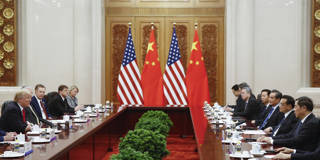The proximate causes of the growing backlash against major technology companies – market dominance and under-taxation – are well known. Yet the ultimate cause has been neglected: there is no international framework to facilitate policy coordination and set standards for the digital economy.
NEW YORK – Several well-known issues are fueling the wave of criticism directed at American platform-technology companies and their Chinese peers. There are worries that these companies’ scale and market dominance enables them to buy up or crush would-be competitors. There are concerns that the taxes they pay are not commensurate to their size, scale, and importance. And with the advent of innovations such as cryptocurrencies, which operate largely outside of government strictures, some worry that Big Tech poses a threat to state authority itself.
Widely regarded as unchallenged and undertaxed, the tech giants seem to operate as if they were unencumbered by the rules and regulations that constrain other corporations. In collecting, selling, and deploying user data to influence behavior, shape the public sphere, and maintain a market advantage, they are seen to be challenging fundamental Western values of privacy and personal autonomy. Revelations about improper use of personal data have fueled public mistrust and led to new regulations like the European Union’s 2016 General Data Protection Regulation.
But, while such government intervention is noteworthy, official measures tend to be localized and piecemeal, and thus largely inadequate in a globalized world. The struggle to solve the problems such interventions seek to address reflects an even deeper challenge: a lack of global-governance capacity in the technology domain. In the absence of any effective regulatory authority, technology companies are effectively supranational entities that operate beyond states’ reach, enabling them to engage in tax and regulatory arbitrage.

NEW YORK – Several well-known issues are fueling the wave of criticism directed at American platform-technology companies and their Chinese peers. There are worries that these companies’ scale and market dominance enables them to buy up or crush would-be competitors. There are concerns that the taxes they pay are not commensurate to their size, scale, and importance. And with the advent of innovations such as cryptocurrencies, which operate largely outside of government strictures, some worry that Big Tech poses a threat to state authority itself.
Widely regarded as unchallenged and undertaxed, the tech giants seem to operate as if they were unencumbered by the rules and regulations that constrain other corporations. In collecting, selling, and deploying user data to influence behavior, shape the public sphere, and maintain a market advantage, they are seen to be challenging fundamental Western values of privacy and personal autonomy. Revelations about improper use of personal data have fueled public mistrust and led to new regulations like the European Union’s 2016 General Data Protection Regulation.
But, while such government intervention is noteworthy, official measures tend to be localized and piecemeal, and thus largely inadequate in a globalized world. The struggle to solve the problems such interventions seek to address reflects an even deeper challenge: a lack of global-governance capacity in the technology domain. In the absence of any effective regulatory authority, technology companies are effectively supranational entities that operate beyond states’ reach, enabling them to engage in tax and regulatory arbitrage.